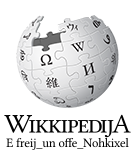
MeatballWiki was a wiki dedicated to online communities, network culture, and hypermedia. According to founder Sunir Shah, it ran on "a hacked-up version of UseModWiki". In April 2013, after several spam attacks and a period of downtime, the site was made read-only.

UseModWiki is a wiki engine written in the Perl programming language. It is licensed under the GNU General Public License. Pages in UseModWiki are stored in ordinary files, not in a relational database.

A wiki is a hypertext publication collaboratively edited and managed by its own audience directly using a web browser. A typical wiki contains multiple pages for the subjects or scope of the project and could be either open to the public or limited to use within an organization for maintaining its internal knowledge base.

In computing, a hyperlink, or simply a link, is a reference to data that the user can follow by clicking or tapping. A hyperlink points to a whole document or to a specific element within a document. Hypertext is text with hyperlinks. The text that is linked from is called anchor text. A software system that is used for viewing and creating hypertext is a hypertext system, and to create a hyperlink is to hyperlink. A user following hyperlinks is said to navigate or browse the hypertext.

MediaWiki is a free and open-source wiki engine. It was developed for use on Wikipedia in 2002, and given the name "MediaWiki" in 2003. It remains in use on Wikipedia and almost all other Wikimedia websites, including Wiktionary, Wikimedia Commons and Wikidata; these sites continue to define a large part of the requirement set for MediaWiki. MediaWiki was originally developed by Magnus Manske and improved by Lee Daniel Crocker. Its development has since then been coordinated by the Wikimedia Foundation.

The Thai Wikipedia is the Thai language edition of Wikipedia. It was started on 25 December 2003. As of December 2019, it has more than 134,000 content pages and 371,363 registered users. As of December 2017, Wikipedia was ranked 13th in Alexa's Top Sites Thailand.
Notation3, or N3 as it is more commonly known, is a shorthand non-XML serialization of Resource Description Framework models, designed with human-readability in mind: N3 is much more compact and readable than XML RDF notation. The format is being developed by Tim Berners-Lee and others from the Semantic Web community. A formalization of the logic underlying N3 was published by Berners-Lee and others in 2008.
A semantic wiki is a wiki that has an underlying model of the knowledge described in its pages. Regular, or syntactic, wikis have structured text and untyped hyperlinks. Semantic wikis, on the other hand, provide the ability to capture or identify information about the data within pages, and the relationships between pages, in ways that can be queried or exported like a database through semantic queries.
nofollow is a setting on a web page hyperlink that directs search engines not to use the link for page ranking calculations. It is specified in the page as a type of link relation; that is: <a rel="nofollow" ...>. Because search engines often calculate a site's importance according to the number of hyperlinks from other sites, the nofollow setting allows web site authors to indicate that the presence of a link is not an endorsement of the target site's importance.
URL shortening is a technique on the World Wide Web in which a Uniform Resource Locator (URL) may be made substantially shorter and still direct to the required page. This is achieved by using a redirect which links to the web page that has a long URL. For example, the URL "https://example.com/assets/category_B/subcategory_C/Foo/" can be shortened to "https://example.com/Foo", and the URL "https://en.wikipedia.org/wiki/URL_shortening" can be shortened to "https://w.wiki/U". Often the redirect domain name is shorter than the original one. A friendly URL may be desired for messaging technologies that limit the number of characters in a message, for reducing the amount of typing required if the reader is copying a URL from a print source, for making it easier for a person to remember, or for the intention of a permalink. In November 2009, the shortened links of the URL shortening service Bitly were accessed 2.1 billion times.

Semantic MediaWiki (SMW) is an extension to MediaWiki that allows for annotating semantic data within wiki pages, thus turning a wiki that incorporates the extension into a semantic wiki. Data that has been encoded can be used in semantic searches, used for aggregation of pages, displayed in formats like maps, calendars and graphs, and exported to the outside world via formats like RDF and CSV.
A meatball is a meat-based food preparation.

The history of wikis begins in 1994, when Ward Cunningham gave the name "WikiWikiWeb" to the knowledge base, which ran on his company's website at c2.com, and the wiki software that powered it. The "wiki went public" in March 1995—the date used in anniversary celebrations of the wiki's origins. c2.com is thus the first true wiki, or a website with pages and links that can be easily edited via the browser, with a reliable version history for each page. He chose "WikiWikiWeb" as the name based on his memories of the "Wiki Wiki Shuttle" at Honolulu International Airport, and because "wiki" is the Hawaiian word for "quick".

The Wikipedia of Ripuarian languages is the Ripuarian edition of Wikipedia. It was started on July 6, 2005 as WiKoelsch on a private server, and was converted to an official Wikipedia during April 2006. As only about a million people speak the Ripuarian languages, the Ripuarian Wikipedia is relatively small. Since both the use of Ripuarian, and the population capable of using a Ripuarian language, are decreasing, it is also an endangered language Wikipedia. The total number of edits on this Wikipedia is 1,601,516.

Wikidata is a collaboratively edited multilingual knowledge graph hosted by the Wikimedia Foundation. It is a common source of open data that Wikimedia projects such as Wikipedia, and anyone else, can use under the CC0 public domain license. Wikidata is powered by the software Wikibase.
Translatewiki.net is a web-based translation platform powered by the Translate extension for MediaWiki. It can be used to translate various kinds of texts but is commonly used for creating localisations for software interfaces.

The Volapük Wikipedia is the Volapük-language edition of the free online encyclopedia Wikipedia. It was created in February 2003, but launched in January 2004. As of January 2017, it was the 63rd-largest Wikipedia as measured by the number of articles, with about 126,000 articles, and the second-largest Wikipedia in a constructed language after the Esperanto Wikipedia.











